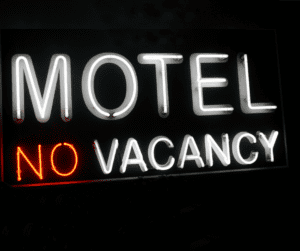Overbooking is a strategic tool used by hoteliers to guard against leaving guestrooms vacant so they can maximize occupancy and revenue. While 100% occupancy is the ultimate reward, overbooking risks displacing guests and having to “walk” them another property at the hotel’s expense. Is overbooking worth the risk to your independent hotel? Let’s take a closer look.

Why overbooking occurs?
When hoteliers strategically overbook, they’re anticipating a number of no shows and/or cancellations. When their assumptions are correct, they’re able to achieve occupancy and revenue goals without displacing guests. However, when hoteliers over estimate or when guest rooms are unexpectedly taken offline for maintenance, etc., they must diligently work to re-book travelers who are suddenly left without accommodations.
What happens when hotels are overbooked and who’s affected?
Hotels are likely to know they’re overbooked well before the affected guests arrive, so that gives them an opportunity to execute their action plan. First, hotels should check for any booking mistakes to ensure the property is truly 100% occupied. If there are no vacancies, hotels should determine which guests can be “walked” and where they will go. Every property has their own “walking” checklist, but in many cases, guests booked for only one night or business travelers are most likely to be selected due to their short-term stays. Once determined, hotels must leverage their relationships with local properties offering similar quality and guest experience to re-book their “walked” guests.
After re-booking, hotels must begin the guest recovery process which, if well executed, can deter any long-term negative effects. This includes communicating with the “walked” guests, arranging transportation to their new hotel, and identifying any measures that can be taken to ensure the experience is seamless.

What’s the outcome?
Overbooking, whether strategic or unexpected, is something independent hotels should expect to encounter at some point in time. Displacing guests and disrupting their experience can lead to negative online reviews, damaged guest relationships, and potential loss of future bookings and revenue. However, if a hotel has a great overbooking and guest recovery strategy in place, “walking” guests can showcase the property’s high-quality customer care and service. Ultimately, it’s how over-bookings are handled that will determine their true value to independent hotels.
If your independent hotel needs to improve how over-bookings are managed, innRoad is here to help. Schedule an appointment with one of our independent hotel experts today to learn how our cloud-based hotel management software can help you better manage inventory so you can maximize every opportunity to grow occupancy and revenue.
